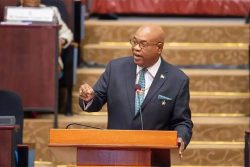(Trinidad Express) The jury in the sedition trial of Jamaat-al-Muslimeen leader, Imam Yasin Abu Bakr, is expected to deliberate on the evidence today and possibly return with a verdict.
Trial Judge, Justice Mark Mohammed, told the nine-member jury with four alternates yesterday that he was very near the end of his summation which began on Monday. Mohammed is expected to spend between 30 minutes and one hour completing his directions in law following which the jurors would be allowed to retire to the jury room.
Mohammed spent most of yesterday’s sitting reviewing the main arguments advanced to the jury by Bakr’s attorney, Wayne Sturge, and lead attorney for the State, Dana Seetahal.
The trial is being heard in the Third Criminal Court at the Hall of Justice in Port of Spain.
Bakr, 70, of La Puerta in Diego Martin, is charged with communicating a statement having seditious intention, two counts of inciting to demand with menaces with intent to steal and endeavouring to provoke a breach of the peace.
The charges arose out of comments he made during an Eid-ul-Fitr sermon delivered at the Jamaat’s Mucurapo Road, St James mosque on November 4, 2005. Portions of the sermon about the collection of Zakaat (similar to tithes offered by the Christian community) were aired later that day during CNC 3’s 7 p.m. newscast.
A seditious intention is defined as “an intention to engender or promote feelings of ill-will or hostility between one or more sections of the community on the one hand, and any other section or sections of the community on the other hand”.
In his summation, Mohammed told the jurors that it is not necessary to prove that the statements have actually caused ill-will or hostility in order to establish the defence.
“Encouragement to violence is not a necessary ingredient of the offence of Sedition as defined in the Sedition Act,” Mohammed said.
“In other words, the Sedition Act does not require proof from the words themselves of any intention to produce a violent result.”
During the sermon, Bakr told the congregation that the system of collecting and distributing Zakaat was designed by the Muslim prophet Muhammad for the purpose of eradicating poverty among the Muslim community.
He said the Muslims in Trinidad were going about the collection and distribution of Zakaat in the wrong way and not in accordance with Allah’s (God’s) instructions.
Bakr said to his membership that Allah promised to provide for them and their children.
“How come you are poor?” Bakr had asked.
“You either doing something that you not supposed to do, or you not doing something what you are supposed to do, or somebody has taken your sustenance, in which case you go and take it back.”
Bakr said the nation’s wealth, derived from the natural resources provided by Allah for all citizens of Trinidad and Tobago, was not being equally shared.
“If somebody takes something that belongs to you and they do not want to give it back to you, then it is your duty, in the Quran (Muslim holy book), by the support of Allah, to take it back from them. It is yours and somebody took it away from you…”
Bakr said Prophet Muhammad used to designate people to go and collect Zakaat.
Trending








